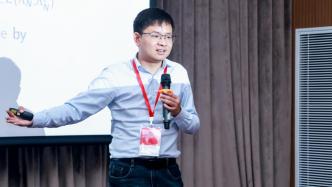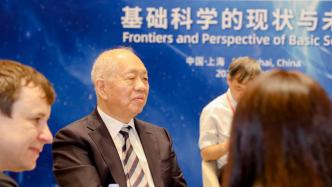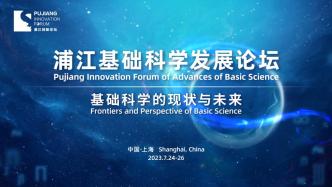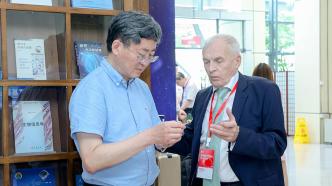
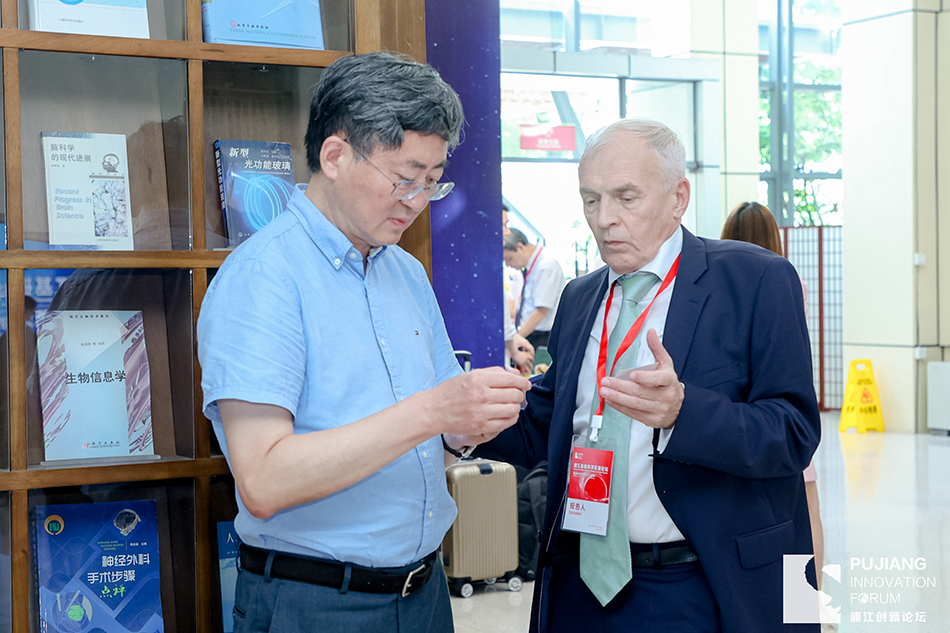
Li Jun (left), academician of the Chinese Academy of Sciences and director of the Shanghai Center for Mathematics at Fudan University.
At 1 p.m. on July 24, Li Jun, academician of the Chinese Academy of Sciences, chief professor of the Shanghai Mathematical Center of Fudan University, and professor of the School of Mathematical Sciences, was surrounded by the crowd and stood to accept media interviews and video recordings. At the age of 62, he has gray hair and speaks a little faster, sharp and frank as usual.
In about 20 minutes, he quickly answered the questions, left the interview area, and returned to the scene of the Pujiang Basic Science Development Forum. He is an "English-speaking mathematician", full of international style. Inside and outside the venue, he switched between Chinese and English to greet and communicate with old and new friends.
"One point of communication (on the forum) is that I hope to bring them back and (let them) be in Shanghai." Li Jun said.
From the 24th to the 26th, nearly 40 top scientists from home and abroad, including many Fields Medal winners and academicians from various countries, will discuss "the current situation and future of basic science" at the Pujiang Basic Science Development Forum, the 2023 Pujiang Innovation Forum conference season.
Li Jun is currently the director of the Shanghai Mathematical Center. He is engaged in the research of the modulus space of algebraic geometry. He returned to China in 2019 to teach at Fudan University, and was elected as an academician of the Chinese Academy of Sciences in 2021. Before returning to China, he was a tenured professor in the Department of Mathematics at Stanford University.
Cross has a future
Regarding the work in the Shanghai Mathematics Center proposed by Gu Chaohao, a famous mathematician and academician of the Chinese Academy of Sciences, Li Jun said, "I do theoretical mathematics, and the development of theoretical mathematics is relatively perfect. We have many very good academic articles published in very good academic journals. But (in) crossover, in a sense, we have not fully done it yet."
He said that compared with some places in China, Shanghai has done quite well in interdisciplinary scientific research, "but there is still a gap in the international arena."
Regarding interdisciplinary research, Li Jun took the intersection of mathematics and medical disciplines as an example. He said that in the past, due to historical reasons, the data was stored in various hospitals, and the format of the data in each hospital was not exactly the same, so it was difficult to share. Also, very sensitively, patient privacy is involved. On the one hand, these data must conceal personal identity information, and on the other hand, the data must be organized. "Mathematics must be included."
On the morning of the 24th, at the opening ceremony of the Pujiang Basic Science Development Forum, the guest speaker, world-renowned mathematician and dean of Qiuzhen Academy of Tsinghua University, Qiu Chengtong said, "If mathematics itself does not develop, then the application cannot be done." "Interdisciplinary disciplines can only intersect because the two disciplines are very strong."
Qiu Chengtong said, "There are many subjects that are closely related to mathematics. One of them, I think, is the intersection of biomedicine and mathematics in recent years. Biology was basically an experimental science. My son did a good job in experiments and saw many wonderful results." "Data needs to be organized, and mathematicians will make a lot of contributions in terms of the ability to organize."
Talent Retention: To Attract the Best Students to Study in China for Graduate Studies
The development of mathematics needs talents, and the solution lies in the introduction and retention of talents.
Li Jun said that for outstanding international talents, they already have their own businesses in the United States or Europe. To attract them, first of all, in terms of career, can they develop faster and bigger in 10 years? The second is the environment. "My understanding is that we all have a large environment and a small environment. The small environment must be built particularly well, and then the large environment hopes to develop better in our country."
In addition, talent must be retained.
Li Jun said that to train students, the most important thing now is to attract good students to study as graduate students in China. "Now the Ministry of Education is already giving us policies to do this." In the original words, we sent out the best students, and then we couldn't find the best students ourselves. "We hope that by establishing a cooperative system with some international research institutes or universities, we can then send students to them to study, for example, for half a year or three months a year, to learn to do tasks with the best teachers, and then at the same time invite those teachers to bring some tasks..."
Is mathematics a niche subject?
Li Jun doesn't think so. In his opinion, it is more like a pyramid, although the tip of the tower is small, but the body of the tower is very large.
To a certain extent, the forum that day was like Li Jun's "home court".
In March 1961, Li Jun was born in Shanghai. In 1982, he graduated from the Mathematics Department of Fudan University with a bachelor's degree, and then he was admitted as a postgraduate student at Fudan University.
According to the official website of the School of Mathematical Sciences of Fudan University, "During his graduate studies, Li Jun met Mr. Gu Chaohao and his mentor Mr. Hu Hesheng. They devoted a lot of effort to Li Jun, and later recommended him to Mr. Qiu Chengtong, and specially approved Li Jun to graduate early and go to the United States to study for a doctorate. In 1989, under the guidance of Mr. Qiu Chengtong, Li Jun obtained a doctorate at Harvard University."
At the opening of the Pujiang Basic Science Development Forum, Qiu Chengtong said, "Now, many of the best students aim at Peking University and Tsinghua University, but I think this is not something that cannot be changed. After all, American universities are also distributed in different places in the United States. We should not only have Peking University and Tsinghua University in China. I think Fudan University and other universities should also be able to train world-class scholars."
Qiu Chengtong said, "We not only absorb students from the Jiangnan area, but also the best students in the country. We also hope to attract the best students from all over the world to China. It is an international exchange. Like the famous American schools MIT, Harvard University, etc., they accept students from all over the world, not only from the United States. So I think we in Shanghai also have this mind to accept the best students in the world."

